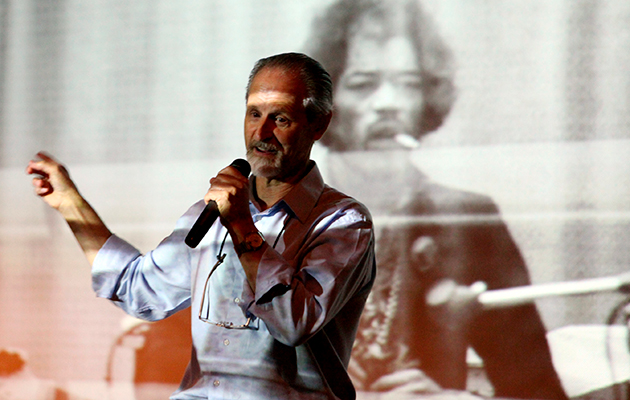Traffic
Traffic
Island/United Artists, 1968
Steve Winwood and co’s expansive second album, recorded by Kramer and producer Jimmy Miller
Of course, Steve Winwood was a genius, he had a fabulous voice and was a great musician. All those accolades absolutely apply: however, if it were not for Jimmy Miller, Traffic would never have sounded like it finally did, nor would it have been as exciting as it was, because Jimmy added so much… in terms of his production techniques, his ability to get into the heart and soul of the band and how they wrote and how they created. He was, I think, the greatest producer of that era. Traffic were very fortunate, they had this country place [Aston Tirrold, Berkshire], where they’d do a lot of pre-production and work on the material, so by the time they came into the studio, it was pretty well sorted out. Musicians in those days didn’t bugger around too much, except if you were the Stones, who’d use the studio as a rehearsal space and then record. But Traffic were pretty damn tight; it was just a question of Jimmy Miller pulling an amazing performance out of their arses, which he did every night. In “Dear Mr Fantasy” – the double-time section at the end – we’ve got the whole thing down and it’s sounding cool. But all of a sudden, Jimmy disappears and then jumps up on the stage in the studio, grabs a pair of maracas and when the double-time comes in, he’s just kicking it. The band look up, startled to see Jimmy there, and just get into this very exciting jam. He realised it needed a big kick in the butt and that’s what he did. Jimmy was a drummer, an entertainer – he grew up in Las Vegas – a comedian, a great musician. He just had an innate instinct, and that’s what a great producer does. I wanted to model myself after him when I eventually became a producer three years later.
________________________
The Rolling Stones
Beggars Banquet
Decca, 1968
Kramer and Miller team up again for the Stones’ back-to-basics classic
The best records the Stones ever made were with Jimmy Miller. Beggars Banquet was going back to their roots, which is what Jimmy was so good at doing. He understood where they got their blues influence from and he wanted to extract that raw, basic, rocking Stones – and boy, did he do that! I started with the Stones in 1967 as an assistant engineer working on Between The Buttons, the Flowers album, Their Satanic Majesties Request. I managed to play percussion, I think, on there. While we were making Beggars Banquet, we’d book a session for 7pm and most of them wouldn’t show up ’til midnight if you were lucky. And then they’d go ’til 5 or 6am, and then there’d be another session coming in the studio at eight or nine and so they’d all have to bugger off! They’d usually get a track done in that time. Even if Brian Jones showed up, he’d probably do a solo and collapse, the poor bloke. He was a genius, though. The beginning of “Street Fighting Man”? My recollection is that Jimmy Miller brought in a Wollensak – a cassette machine with one mic built in – stuck it on the floor, pressed ‘Record’ and the band just made a circle around it. And that was the basic track. Now, of course, Keith says it was his idea and his tape machine, but I don’t quite remember it that way.



